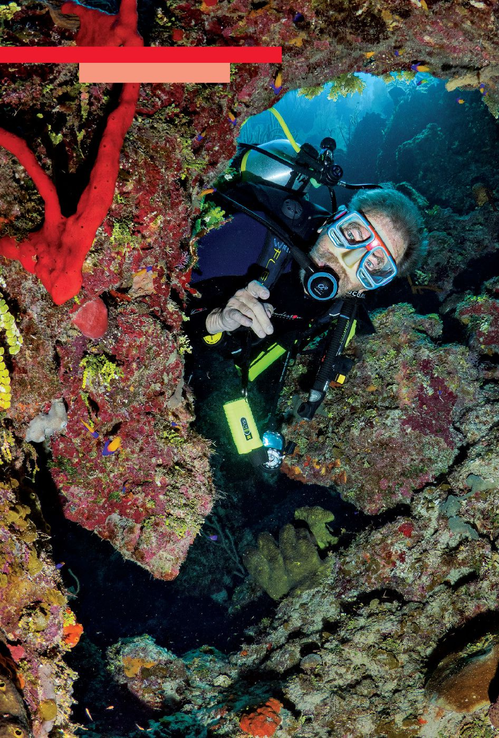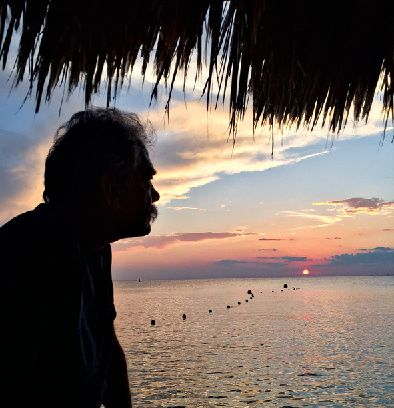It Can Happen to Anyone

The author peeks through a swim-through in Cozumel.
CREDITS | Text by Brad Wall | Photos courtesy of Brad Wall
I First bceame certified to dive in college, but it was a long time before diving became a big
part of my life. Since associating myself with a local dive shop in the early 1990s, I became a divemaster and instructor and taught locally in Monterey Bay, California.
I usually take two dive trips a year with my wife and sometimes our son, who are both experienced divers. We almost always go to Cozumel, Mexico, which is where I first experienced
decompression illness (DCI). I was 68 years old and had completed more than 900 dives when we traveled to Cozumel for our 2018 dive trip. We always stay at the same dive resort and are in the water for a checkout dive a couple of hours after arriving. On the first full day of diving, we started in the morning with a 29-minute dive to 82 feet with a one-hour surface interval before a second, uneventful dive.
The following day we were ready for my favorite site, Santa Rosa Wall. After descending to the
sandy bottom around 50 feet, you drop another 30 feet or so to move northward along the wall. Large swim-throughs dot the house-sized boulders as you drift beside the reef.
When it was time to end the dive, my buddy and I ascended to 20 feet for our safety stop. Everything was normal, as was the rest of our ascent. As soon as we surfaced I thought I saw the boat moving away from me but quickly realized I was disoriented and the boat wasn’t moving. It felt like vertigo, but I managed to get on board the boat.
I removed my gear and was talking to my buddy when I started involuntarily leaning forward until I lost my balance and collapsed face-down on the deck. The problem was in my spine, and I felt paralyzed and couldn’t get up. Our divemaster immediately gave me 100 percent oxygen and notified the captain. We quickly returned to the resort dock. At some point during the ride back they had called to shore and contacted DAN, who seamlessly arranged for everything
that I needed. When we arrived at the dock, a paramedic was waiting to transport me to the local hospital, which was only a mile away.
They had to drag me off the boat, with one person under each arm, because I could not walk.
We arrived at the hospital in downtown Cozumel, where they did an echocardiogram to check for a possible patent foramen ovale (PFO) or perhaps a blood vessel blockage.
I First bceame certified to dive in college, but it was a long time before diving became a big
part of my life. Since associating myself with a local dive shop in the early 1990s, I became a divemaster and instructor and taught locally in Monterey Bay, California.
I usually take two dive trips a year with my wife and sometimes our son, who are both experienced divers. We almost always go to Cozumel, Mexico, which is where I first experienced
decompression illness (DCI). I was 68 years old and had completed more than 900 dives when we traveled to Cozumel for our 2018 dive trip. We always stay at the same dive resort and are in the water for a checkout dive a couple of hours after arriving. On the first full day of diving, we started in the morning with a 29-minute dive to 82 feet with a one-hour surface interval before a second, uneventful dive.
The following day we were ready for my favorite site, Santa Rosa Wall. After descending to the
sandy bottom around 50 feet, you drop another 30 feet or so to move northward along the wall. Large swim-throughs dot the house-sized boulders as you drift beside the reef.
When it was time to end the dive, my buddy and I ascended to 20 feet for our safety stop. Everything was normal, as was the rest of our ascent. As soon as we surfaced I thought I saw the boat moving away from me but quickly realized I was disoriented and the boat wasn’t moving. It felt like vertigo, but I managed to get on board the boat.
I removed my gear and was talking to my buddy when I started involuntarily leaning forward until I lost my balance and collapsed face-down on the deck. The problem was in my spine, and I felt paralyzed and couldn’t get up. Our divemaster immediately gave me 100 percent oxygen and notified the captain. We quickly returned to the resort dock. At some point during the ride back they had called to shore and contacted DAN, who seamlessly arranged for everything
that I needed. When we arrived at the dock, a paramedic was waiting to transport me to the local hospital, which was only a mile away.
They had to drag me off the boat, with one person under each arm, because I could not walk.
We arrived at the hospital in downtown Cozumel, where they did an echocardiogram to check for a possible patent foramen ovale (PFO) or perhaps a blood vessel blockage.

Wall watches the sunset from shore.
After performing a neurologicalassessment to rule out an embolism, they admitted me to the hospital and determined that I had DCI. The first U.S. Navy Table 6 chamber treatment did some good, but I was hospitalized overnight and spent almost five hours in the chamber for the same treatment again the next day.
After that recompression, I didn’t pass the walking test, so the doctors determined the DCI still
wasn’t fully resolved. I spent another two hours in the chamber that day and another two
hours on the third day, receiving IV fluids and rest after each treatment, but no other procedures were necessary. The doctors finally released me after four long chamber rides over
three days, and I walked out of the hospital without any assistance. DAN made all the arrangements for my care behind the scenes. I was grateful that I didn’t have to worry,
especially since I probably wasn’t fit to have those discussions anyway.
I’ve been a DAN member for more than 20 years, and my membership and dive accident insurance were vitally important on this trip. As an insurance broker, I know that most
medical policies don’t cover many incidents that can happen in the water — and not just to divers, so I always keep my DAN membership and dive accident insurance current.
Even when you are well-trained and conscientious and you do everything right, you can still get
bent at any time. After reviewing my dive profile from my dive computer, I concluded that I had done nothing wrong — no fast ascent, no missed safety stops — but I got DCI anyway. My
experience taught me that whether you’ve made nine or 900 dives and whether you’re a beginning diver or a divemaster, you need to be prepared for anything to happen.
The final hospital bill for my treatment was more than $22,000, but I never had to pay a dime. I realized that I could afford my DAN insurance for more than a lifetime for less than this one
incident would have cost me. When I was cleared to fly, I returned home and met with my
cardiologist to review the images from my stay in the Cozumel hospital and to take some additional tests. I didn’t have a PFO, and later that year I was cleared to return to diving.
I had DAN dive accident insurance coverage for a long time before I needed it, and even if I
never need it again, it has more than paid for itself. As I continue to dive for as long as I am able, I will never be without DAN. AD
After that recompression, I didn’t pass the walking test, so the doctors determined the DCI still
wasn’t fully resolved. I spent another two hours in the chamber that day and another two
hours on the third day, receiving IV fluids and rest after each treatment, but no other procedures were necessary. The doctors finally released me after four long chamber rides over
three days, and I walked out of the hospital without any assistance. DAN made all the arrangements for my care behind the scenes. I was grateful that I didn’t have to worry,
especially since I probably wasn’t fit to have those discussions anyway.
I’ve been a DAN member for more than 20 years, and my membership and dive accident insurance were vitally important on this trip. As an insurance broker, I know that most
medical policies don’t cover many incidents that can happen in the water — and not just to divers, so I always keep my DAN membership and dive accident insurance current.
Even when you are well-trained and conscientious and you do everything right, you can still get
bent at any time. After reviewing my dive profile from my dive computer, I concluded that I had done nothing wrong — no fast ascent, no missed safety stops — but I got DCI anyway. My
experience taught me that whether you’ve made nine or 900 dives and whether you’re a beginning diver or a divemaster, you need to be prepared for anything to happen.
The final hospital bill for my treatment was more than $22,000, but I never had to pay a dime. I realized that I could afford my DAN insurance for more than a lifetime for less than this one
incident would have cost me. When I was cleared to fly, I returned home and met with my
cardiologist to review the images from my stay in the Cozumel hospital and to take some additional tests. I didn’t have a PFO, and later that year I was cleared to return to diving.
I had DAN dive accident insurance coverage for a long time before I needed it, and even if I
never need it again, it has more than paid for itself. As I continue to dive for as long as I am able, I will never be without DAN. AD
Categories
2025
2024
February
March
April
May
October
My name is Rosanne… DAN was there for me?My name is Pam… DAN was there for me?My name is Nadia… DAN was there for me?My name is Morgan… DAN was there for me?My name is Mark… DAN was there for me?My name is Julika… DAN was there for me?My name is James Lewis… DAN was there for me?My name is Jack… DAN was there for me?My name is Mrs. Du Toit… DAN was there for me?My name is Sean… DAN was there for me?My name is Clayton… DAN was there for me?My name is Claire… DAN was there for me?My name is Lauren… DAN was there for me?My name is Amos… DAN was there for me?My name is Kelly… DAN was there for me?Get to Know DAN Instructor: Mauro JijeGet to know DAN Instructor: Sinda da GraçaGet to know DAN Instructor: JP BarnardGet to know DAN instructor: Gregory DriesselGet to know DAN instructor Trainer: Christo van JaarsveldGet to Know DAN Instructor: Beto Vambiane
November
Get to know DAN Instructor: Dylan BowlesGet to know DAN instructor: Ryan CapazorioGet to know DAN Instructor: Tyrone LubbeGet to know DAN Instructor: Caitlyn MonahanScience Saves SharksSafety AngelsDiving Anilao with Adam SokolskiUnderstanding Dive Equipment RegulationsDiving With A PFOUnderwater NavigationFinding My PassionDiving Deep with DSLRDebunking Freediving MythsImmersion Pulmonary OedemaSwimmer's EarMEMBER PROFILE: RAY DALIOAdventure Auntie: Yvette OosthuizenClean Our OceansWhat to Look for in a Dive Boat
2023
January
March
Terrific Freedive ModeKaboom!....The Big Oxygen Safety IssueScuba Nudi ClothingThe Benefits of Being BaldDive into Freedive InstructionCape Marine Research and Diver DevelopmentThe Inhaca Ocean Alliance.“LIGHTS, Film, Action!”Demo DiversSpecial Forces DiverWhat Dive Computers Don\'t Know | PART 2Toughing It Out Is Dangerous
April
